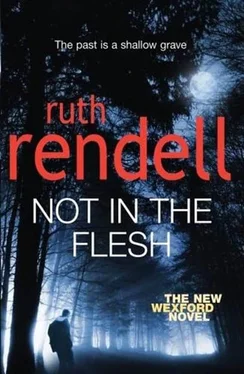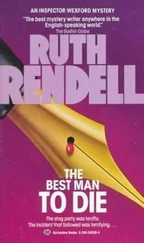In the end Mrs. McNeil collapsed in tears. It was impossible to continue that day, and while Adam Thayer drove her home, Wexford came to a decision. He wouldn't charge her yet. Once he had done so he wouldn't be allowed to go on questioning her. There was talk of the law being changed, but it hadn't been changed yet.
His mind made up, he contemplated the list of missing persons that went back just eight years and Peach's list of the missing that extended much further than that. Ronald McNeil had shot the man in Grimble's house in September 1998, but, according to both lists, although an eighteen-year-old girl had disappeared in that month (and been found two weeks later), no man had gone missing between June 1998 and the following January. There was one group they hadn't yet checked on-the itinerant farmworkers.
They had camped on Grimble's Field in June 1995 but, three years later in September, were on a field set aside for them by the farmer on the other side of Flagford. Such people had once been called “Gypsies” whether they were Romany or not. They possibly had settled homes in the winter months, but in the warmer weather they moved from county to county, camping where they could, offering themselves as unskilled farmworkers where fruit or vegetables were to be harvested. These days things had changed and they had been replaced by asylum seekers or simply by visitors from Eastern Europe who came to work and raise money to take home after the season ended.
When Burden came in he asked him what he made of his theory that the man Ronald McNeil had shot was one of them.
“A thousand pounds is a big sum of money for someone like that to be carrying about with him,” Burden said.
“Yes, he wouldn't accumulate that picking apples at the rates these fruit farmers pay. But when we talked of this before, you said one of the itinerants might have come back for the purposes of blackmail. How about that?”
“You mean he'd been here three years earlier, found out something a Flagford citizen wouldn't want made public, and, when he came back, extracted money from them for his silence? Okay, I can see that. Why take the money into Grimble's house? Why go there at all? Presumably he came in a caravan or mobile home. Why not go back to it?”
“Suppose he no longer intended to pick fruit, now he'd got the money? He went into Grimble's house, where very likely he had been before-it was easy enough to get in. The entire population of Flagford seems to have been in and out. I don't know why he couldn't have washed himself in his mobile home or, come to that, in a shower provided on the site. But the only evidence we have that he was ever in that bathroom comes from Mrs. McNeil. He may have been, he may have thought there would have been plenty of water on tap and he wanted to wash himself properly. The clothes he took off had almost reached the rags stage. I think he planned on taking clothes out of old Grimble's wardrobe.”
Burden seemed taken with this theory. “What, a suit maybe, or more likely trousers and that sports jacket we saw in there?”
“Probably. But before he could do that, before he's even had his wash, in comes Colonel Blimp, aka Ronald McNeil, with a gun.”
“And no one on that campsite missed him?”
“It all depends on what he intended to do. He may have told his fellow workers that he didn't mean to stay there any longer. He'd got some money-he needn't have said how or where from-he'd found a way of acquiring some decent clothes and once he'd got them he'd be off.”
“Wouldn't they notice he'd left his mobile home or maybe his car behind?”
Wexford shook his head. “Not necessarily. These people don't each have a car and some sort of trailer. Sometimes there'll be three or four in each car. They might have noticed he'd left, say, a backpack behind with some probably valueless stuff inside. They wouldn't report someone as missing because most of them don't have any fixed abode. I think it was one of those fruit-pickers, Mike, and we can proceed on that assumption.”
On his way home he called in on Iman Dirir. He knew she was at home because he saw her dimly through the front window. For a moment he had thought she was her own daughter, for the woman he had glimpsed had long black hair hanging over her shoulders to the middle of her back. She took so long answering the door that he was on the point of ringing the bell again when it opened. She was in the uniform that could be Western or Eastern dress, black trousers and a long shirt. They went into her living room, which was exactly as it might have been if she and her husband had been middle-aged professionals born in Tunbridge Wells, even to the white walls, chintz furniture, and well-stocked bookcase. The plasma television would have been the envy of John Grimble.
“Can I offer you anything? A glass of wine? We don't drink, but we have wine for friends.”
He smiled. “Thank you, but I can't stay. I came to tell you that my Child Protection Officer, a woman who's very good at her job, has been to see Matea's parents and cautioned them about taking their five-year-old girl home. She was tactful. She simply told them that to take a child abroad and have her circumcised was an offense punishable by a maximum of fourteen years' imprisonment.”
“I suppose they denied it,” Iman Dirir said.
“They said they were going for a holiday. How well do you know them?”
“Well enough to call and talk to them. Do you want me to do that?”
“I do,” he said. “Very much. And it should be soon. They leave in a few days' time.”
She put out one long pale brown hand, the nails painted dark red, and took his. It wasn't a simple handshake but rather a gesture of promise or undertaking. “I'll do my best,” she said.
A once-white T-shirt with a scorpion printed on it and the name “Sam.” Memorable enough, Damon Coleman thought. Not the kind of thing he would ever consider wearing himself even if he were called Sam and liked scorpions. His taste ran to the colors that suited black skin, those which perhaps only a black man could successfully wear: red, orange, yellow, bright green. Black was a no-no. Apart from all that, as he hawked the T-shirt around Pickfords, Hunters, Louise Axall, and Theodore Borodin, he marveled that none of them gave a sign of recognizing it. “It's a long time ago” was the phrase most often used as they shook their heads. He had little hope and, after enduring abuse from Grimble, nearly gave up on Bill Runge. The man was out, anyway. Was it worth coming back later? He was walking back to the gate from the front door of Runge's cottage when he met the man coming down the road with a carrier bag. From the smell it evidently contained fish and chips, and when Damon asked if he could have a word, Runge said only if he didn't mind talking while he ate his dinner before it got cold.
The fish and chips, when released from their greaseproof paper, looked inviting. Damon, who had a big, tall man's appetite, averted his eyes and wished he could also turn aside his nostrils. One thing was for sure, once he was out of here, he'd go straight to that fish and chip shop on the corner and buy his own lunch.
The T-shirt was produced and, instead of shaking his head and saying it was a long time ago, Bill Runge said with his mouth full that he thought he'd seen it before. “Just let me think,” he said, pouring tomato ketchup over his fillet of cod as if it was a brain food indispensable when memory had to be summoned.
“Eight years ago in September?” Damon tried to prompt him.
“Might have been. I was in Flagford a lot when I was digging that ditch for my pal Grimble, but it wasn't then, it wasn't that long ago. I mean, normally I've no call to go there.”
“Would you ever have gone to the fruit farm? Morella's, that is?”
Читать дальше











